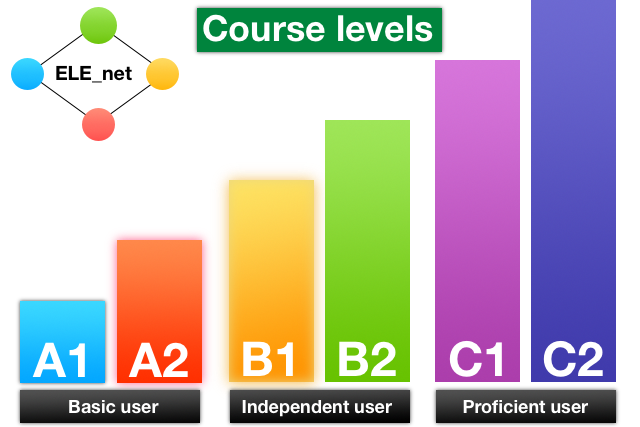Course levels
 Our levels
Our levels
We use the
Common European Framework of Reference for Languages (CEFR) to indicate the levels of the courses we offer students, staff and faculty at AKU. The CEFR is an international standard for describing language ability from A1 for beginners up to C2 for those who have mastered English.
For each level, the CEFR describes what a learner can do in reading, listening, speaking and writing. These reference levels are increasingly accepted around the world as the framework for measuring proficiency in all languages.
What is my level?
You can an idea of your level by completing the
free level tests provided by the
Education First and the British Council. If you have previously taken an English test, such as IELTS or Aptis, you may already know your CEFR level.
The self-assessment grid below uses 'can-do' statements to compare what you can do in reading, writing, speaking and listening, with the CEFR levels. You can use this table to estimate your level of English proficiency.
| |
Listening and speaking
|
Reading
|
Writing
|
|
A1
|
Can understand basic instructions or take part in a basic factual conversation on a predictable topic.
|
Can understand basic notices, instructions or information.
|
Can complete basic forms, and write notes including times, dates and places.
|
|
A2
|
Can express simple opinions or requirements in a familiar context.
|
Can understand straightforward information within a known area, such as on products and signs and simple textbooks or reports on familiar matters.
|
Can complete forms and write short simple letters or postcards related to personal information.
|
|
B1
|
Can express opinions on abstract/cultural matters in a limited way or offer advice within a known area, and understand instructions or public announcements.
|
Can understand routine information and articles, and the general meaning of non-routine information within a familiar area.
|
Can write simple connected text on topics which are familiar or of personal interest.
|
|
B2
|
Can follow or give a talk on a familiar topic or keep up a conversation on a fairly wide range of topics.
|
Can scan texts for relevant information, and understand detailed instructions or advice.
|
Can make notes while someone is talking or write a letter including non-standard requests.
|
|
C1
|
Can contribute effectively to meetings and seminars within own area of work or keep up a casual conversation with a good degree of fluency, coping with abstract expressions.
|
Can read quickly enough to cope with an academic course, to read the media for information or to understand non-standard correspondence.
|
Can prepare/draft professional correspondence, take reasonably accurate notes in meetings or write an essay which shows an ability to communicate.
|
|
C2
|
Can advise on or talk about complex or sensitive issues, understanding colloquial references and dealing confidently with hostile questions.
|
Can understand documents, correspondence and reports, including the finer points of complex texts.
|
Can write letters on any subject and full notes of meetings or seminars with good expression and accuracy.
|
These 'can do' statements were developed by
ALTE (The Association of Language Testers in Europe)
How can I improve my level?
It is estimated that it takes roughly 200 hours of learning for a learner to progress from one level in the CEFR framework to the next. However, there are a number of factors which may mean it takes you more or less time than this. The factors include your motivation levels, the intensity of your study and the amount of language practise you have.
ELE_net offers a
range of courses to help you develop your English language skills and improve your level. You will also find high quality, self study resources here for students, staff and faculty recommended by ELE_net to enhance your language proficiency.

